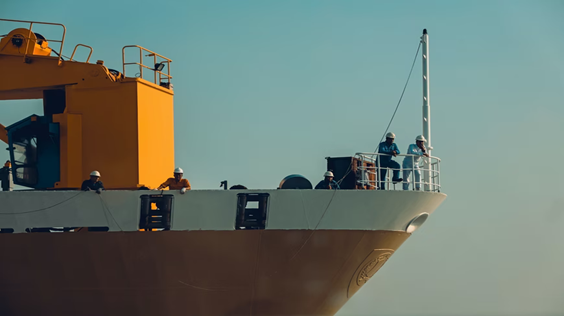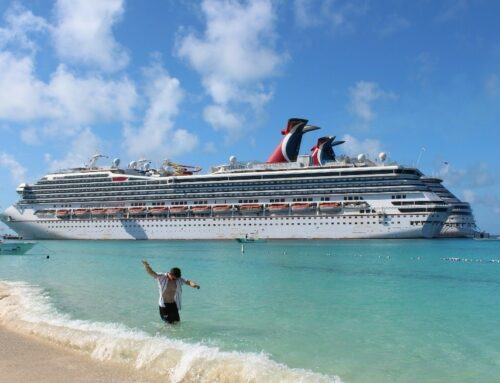COVID-19 and the Consequences of the Crew Change Crisis

A crew aboard a shipping vessel in East Java, Indonesia (Source: Moto Moto SC)
The international shipping industry has endeavored to stay the course this year towards long-term progress in safety as the number of large vessels lost remained at record low levels and reported incidents declined year-on-year, according to Allianz Global Corporate & Specialty SE’s (AGCS) Safety & Shipping Review 2021.
However, the AGCS report also noted that, while the shipping sector has weathered through the coronavirus pandemic, the crew-change crisis brought on by the pandemic may show long-term implications for the industry.
As pandemic-related travel and border restrictions created widespread logistical issues for mariners, the ability of ship operators to complete timely crew changes was heavily impacted. According to the International Chamber of Shipping (ICS), between March and August 2020, just 25% of normal crew changes were able to take place, affecting an estimated 500,000 seafarers. As of July 2021, it is estimated that some 250,000 seafarers remained on board commercial vessels, unable to be repatriated and past the expiry of their contracts, according to the United Nation’s International Mariners Organization (IMO).
Why is this crisis so important? Delays in crew changes raise serious welfare, safety and regulatory concerns. In addition to humanitarian and crew welfare issues, there is an increasing risk that crew fatigue could lead to human error and even serious incidents and deaths.
Crew changes are a compliance concern as well. According to the International Labour Organization (ILO) Maritime Labour Convention (MLC), crew should serve no more than 11 months continuously at sea and throughout their service are entitled to access onshore medical facilities and care. According to the IMO, COVID-19 has caused many seafarers to serve past than this 11 month maximum agreed by the ILO. If ships are unable to operate safely in compliance with international rules, vessels may be declared unseaworthy and may be forced to suspend their operations.
The ongoing crew change crisis is likely to have longer-term effects on the shipping industry as well. Shipping demands are likely to surge across the board as the global economy rebounds, but many crews continue to be stretched thin after working under pandemic conditions for over a year and continue to face many challenges. When COVID-19 infection rates spiked significantly in India earlier this year, one of the world’s largest sources of seafarers, many ports, including Singapore, Hong Kong and the UK, barred vessels and crew that had recently visited India. Due to the risk posed by the Delta variant of the disease, many port states and vessel operators began to restrict Indian seafarers’ movement and employment, with serious financial consequences for these seafarers and their families.
In an effort to provide relief, the IMO established a Seafarer Crisis Action Team and, working with the International Chamber of Shipping (ICS), developed a ‘Framework of Protocols’ for safely conducting crew changes, helping exempt them from various national travel or movement restrictions, and facilitating emergency repatriation and prioritizing vaccinations. Mirroring these calls, more than 450 shipping companies and allied organizations signed the Neptune Declaration on Seafarer Wellbeing and Crew Change. The Seafarers International Relief Fund (SIRF), an emergency relief fund set up by five prominent maritime charities, has raised more than $1.17 million to provide support to seafarers impacted by the COVID-19 crisis.
Ultimately however, a coordinated global vaccination effort is likely to be the ultimate answer to improving crew conditions, although the situation is complicated by restrictions globally. Earlier this year, the ICS warned that lack of access to vaccinations for seafarers is placing shipping in a “legal minefield”, which could cause supply chain disruptions from canceled sailings and port delays. Insurance, liability, and privacy concerns are expected to complicate matters as well. Additionally, though vaccinations could soon become compulsory for employment through major commercial shipping companies, a large portion of the global maritime workforce is currently sourced from developing nations, which could take many years to fully vaccinate. All of these factors continue to challenge and shape the industry, and will likely have a lasting impact on working conditions for crews in the years to come.
The above is a summary of one or more news stories reviewed by the author of this article. It may contain comments or views of the author only.
If you or a loved one is a mariner who has been injured or made ill by COVID or other adverse conditions on board, we at the Herd Law Firm would be pleased to discuss the matter with you, to see if we can help.







